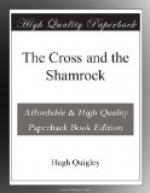After the amputation of the limb he recovered, got his discharge, came back to New York, and, in company with a respectable Catholic citizen, went out about seven miles east of Brooklyn, and there, at the foot of a maple tree, they dug out of the ground, three feet deep, the bag sure enough, containing every sovereign and note of the money stolen from the widow O’Clery. They went with it right straight to the priest of St. Peter’s Church, who, upon hearing the recital of the now penitent thief, promised that he should suffer no legal consequences, and inserted advertisements in the papers to find out where the O’Clerys might be.
This information was communicated to Paul by Mr. Clarke, and to Bridget by Father Ugo, on the same day.
This news, when made known, created the most intense excitement. Amanda was now very polite to Bridget, whom she marked out in her own mind as a suitable wife for her eldest brother Calvin. Paul was declared to be a young “likely gentleman,” of real genius. The two younger brothers, Patrick and Eugene, were lauded, flattered, and admired. In fine, the sudden change which took place in the relation in which they stood in the house of bondage was such as to cause Murty to remark to Paul,—who lost no time in coming to pay for his brothers’ and sister’s board, although the term of servitude of Bridget was now almost expired,—“Paul, I see that it is not our faith that is so much hated by these goodly Christians as our poverty.”
“There may be some truth in that,” replied Paul.




